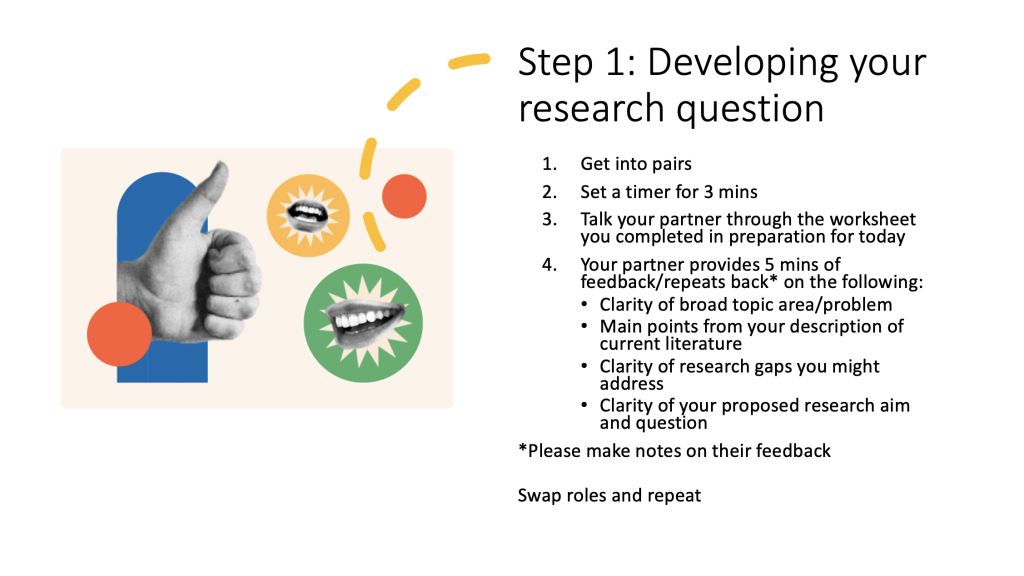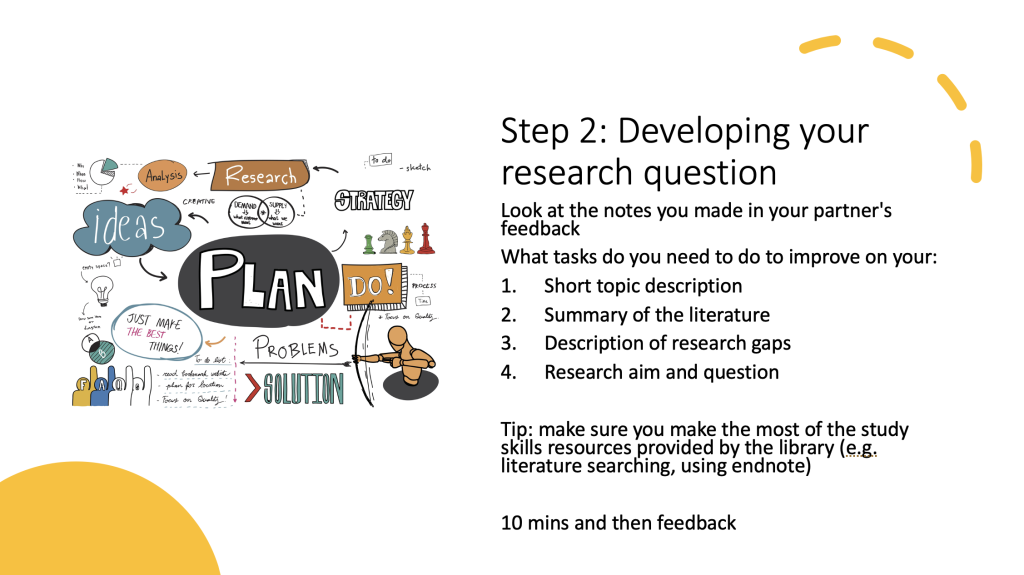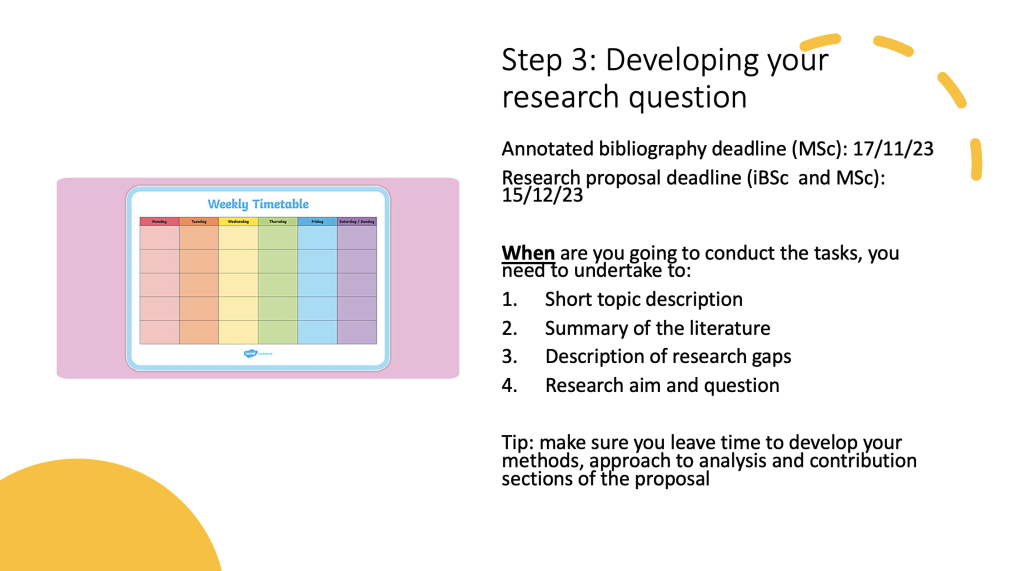Term 1 Dissertation Workshops
| Site: | QMplus - The Online Learning Environment of Queen Mary University of London |
| Module: | IPH6003/IPH7003 Dissertation 2024-25 |
| Book: | Term 1 Dissertation Workshops |
| Printed by: | Guest user |
| Date: | Thursday, 5 February 2026, 7:48 AM |
Description
Description of compulsory term 1 workshops
1. Getting started with your dissertation
Introduction and learning objectives
In this first dissertation workshop, we will review the aims
of the dissertation project and the dissertation process. We will work together
and develop a plan to manage your dissertation workload and develop and scope
out an initial dissertation topic idea during term 1. By the end of the work
shop you will be able to:
- Describe the dissertation process and the
learning activities it involves.
- Recall how to find information and
support about the dissertation.
- Explain how you will start to develop a
dissertation topic.
- Create a plan for your term 1
dissertation activities.
Pre-workshop preparation
In preparation for this dissertation workshop please can you:
- Review the dissertation module information and identify anything you have questions about.
- Identify a 2-3 hour weekly slot during term 1 that you can use to work on your dissertation.
- Write down any topics that you are interested in and are considering for your dissertation.
Workshop materials and exercises
Ther workshop slides can be found here. Below is some key information and short exercises that will help you revise the work we did during the workshop.
What is a dissertation? Before you get started with developing a research question and collecting data it is important to understand what a dissertation is. Specifically, how a dissertation different from the assessments you will submit for your other modules.
A dissertation is an extended piece of extended piece of academic or scholarly work that demonstrates:
- A detailed understanding of a subject.
- Exploration of a research question that arises from a detailed understanding of existing scholarly literature (or lack thereof).
- Educated choice of and the application of research methods.
- Demonstration of critical thinking.
- A contribution to a field of research.
- Ability to conduct an independent research project.
In short a dissertation is a piece of self-directed work. This is not to say that there is not lots of support available for your dissertation. That said, it is your responsibility to drive the dissertation project and collect the tools and skills necessary to complete it. It is also your responsibility to ask for help if you are struggling.
Now you understand what you role is in delivering the dissertation you also need to develop an understanding of what the final dissertation will look like and how it will be assessed. The best way to develop this understanding is read the assessment criteria. We looked at the assessment criteria in the workshop but it is a very good idea to keep on looking at it as you progress your dissertation project. The criteria will help you to structure your final dissertation and understand the kind of content that each chapter should contain.
Now you know what a dissertation is you are ready to start thinking more carefully about developing a topic and a research question.
Useful materials and resources
- The ‘Module Information’ section of the dissertation pages
- The assessment criteria for the dissertation
- The assessment criteria for ARM1
- The QM Library Services Academic Skills pages
2. Turning a topic idea into a research aim and question
Introduction and learning objectives
Over the last few weeks, you should have conducted some scoping research and reading around your dissertation topic, this include the work you have been doing for your ARM1 assessment. In this session we will discuss how to bring the scoping research together and develop a preliminary research aim and research question. By the end of the work shop you will be able to:
- Describe a what a research aim and a research question is.
- Demonstrate how to develop a research aim and question from a period of scoping research.
- Plan how you will develop your dissertation aim and question and write this process up in your ARM1 assignment.
Pre-workshop preparation
At the end of the last dissertation workshop you were asked to write a plan for how you are going to develop a dissertation topic by thinking about the following questions.
- How are you going to get to know your topic OR choose a topic?
- What tools/activities are available to help you do this?
- When will you do this?
Materials that will help you develop your plan:
- ARM 1 assessments (iBSc students, the annotated bibliography exercise is one that will be really helpful to you as it provides a process for you to map and explain the existing literture on a topic )
- Your timetable
- The study skills area on the QM library website
- The Background to Issue, Rationale and Objectives section of the dissertation criteria document (see QM Plus)
- The materials on the 'dissertation workshop 1' page.
- Improve and finalise the plan of work you drafted to help you develop a dissertation topic (see above).
- Implement your topic development plan.
- After you have completed step 1 and 2, write a few words on this worksheet and bring it with you to the next dissertation workshop.
Remember! This activity will also help you develop your research proposal assignment for ARM1.
Workshop materials and activities
Here are the workshop slides. Below are the three exercises we attempted in the workshop. Please repeat them in your own time to help you come up with a set of tasks and a schedule to help you develop the 'Introduction and background/rationale' and 'Research aims, question and objectives' sections of your ARM1 proposal.
Remember, a well researched aim and question will lead to a logical and feasible methodological approach. Try to work through these tasks in pairs. Giving and receiving feedback on your work is an excellent way to learn.



Useful materials and resources
- The assessment information for ARM1
- The ‘Accessing Support’ area of the QM Library Services Academic Skills pages
- The 'Background to Issue, Rationale and Objectives' section of the dissertation criteria
3. Finalising and submitting your research proposal and dissertation Q&A
Introduction and learning objectives
In this final session we will review your progress on the ARM 1 research proposal assessment and confirm the process for submitting your proposed dissertation topic. We will also make time for a general dissertation Q&A and confirm the process for supervisor allocation. By the end of the work shop you will be able to:
- Articulate the steps you need to take to complete and submit your ARM1 research proposal assignment.
- Understand how to submit your dissertation topic so you can be allocated a supervisor.
- Identify any further questions you have about the development of your dissertation proposal.
Pre-seminar preparation
In preparation for this dissertation workshop please can you:
- Identify any worries or gaps in knowledge regarding your ARM1 research proposal assignment.
- Devise questions to ask the academic team to help you progress your ARM1 research proposal assignment.
Workshop Materials and Follow Up
The slides from the workshop can be found here. Andreas has added a further recording of the slides that cover the ARM1 research proposal to the ARM1 assessment area. Please make sure your follow the guidance for your programme of study (iBSc or MSc).
A link to the dissertation topic questionnaire can also be found on the ARM 1 assessment area. Remember the deadline for the completion of the questionnaire is the same as the deadline for the research proposal. If you have been granted extenuating circumstances please still to try to complete the questionnaire on time. Remember, the questionnaire is not assessed and the information you provide by completing it is required so we can match you with a suitable supervisor in a timely manner. We only need basic information to allocate you a supervisor.
Additional QM Plus Areas:
- Past dissertation examples
- Dissertation topic submission survey
- Research Ethics
- Term 2 dissertation workshops